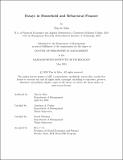Essays in Household and Behavioral Finance
Author(s)
de Silva, Tim
DownloadThesis PDF (9.485Mb)
Advisor
Parker, Jonathan A.
Thesmar, David
Terms of use
Metadata
Show full item recordAbstract
This thesis contains three chapters on household finance and behavioral finance. The first chapter studies how to balance insurance and incentives in student loans with income-contingent repayment, which insure borrowers against income risk but also can reduce their incentives to earn more. Using a change in Australia's income-contingent repayment schedule, I show that borrowers reduce their labor supply to lower their repayments. I use these responses to estimate a dynamic model of labor supply with frictions that generate imperfect adjustment. My estimates imply that the labor supply responses to income-contingent repayment decrease the optimal amount of insurance but are too small to justify fixed repayment contracts. The second chapter studies the role of risk preferences and frictions in portfolio choice, using variation in the default asset allocation of 401(k) plans. We estimate that absent participation frictions, 94% of investors would prefer holding stocks in their retirement accounts, with an equity share of retirement wealth that declines over the life cycle. We use this variation to estimate a structural life cycle portfolio choice model with Epstein-Zin preferences. Our results suggest that the lack of participation in the stock market is mainly due to participation frictions rather than non-standard preferences (e.g., loss-aversion). The third chapter studies the properties of subjective forecasts relative to econometric forecasts at different forecast horizons. In the context of corporate earnings forecasts, we find that sell-side equity analyst forecasts outperform econometric forecasts in the short run but underperform in the long run. We then decompose these differences in forecasting accuracy into information, forecast bias, and forecast noise. We find that noise and bias strongly increase with forecast horizon, while equity analysts’ information advantage decays rapidly. We show that noise increasing with the forecasting horizon generates a mechanical reversal in the sign of the error-revision (Coibion-Gorodnichenko) regression coefficient at longer horizons, independently of over-/underreaction. Finally, we demonstrate that a parsimonious model with bounded rationality and a noisy cognitive default matches the term structures of noise and bias jointly.
Date issued
2024-05Department
Sloan School of ManagementPublisher
Massachusetts Institute of Technology